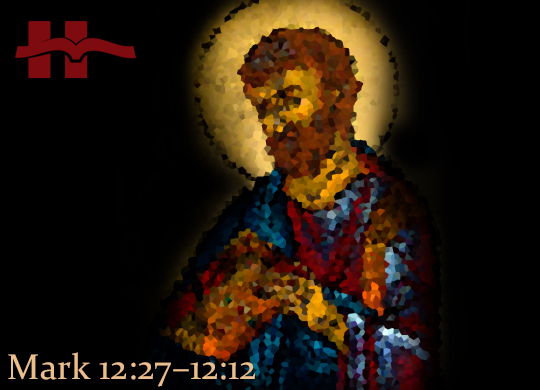Mark 11:27−12:12

Fruit-bearing by disciples is their responsibility of stewardship towards God.
And he sent a slave to the tenant farmers at the right time [of harvest]
in order to receive of the fruits of the vineyard from the tenant farmers.
And taking him, they beat and sent [him back] empty-handed.
Mark 12:2–3
Mark 11:28 is the first instance of the appearance together of all three factions of the Sanhedrin—chief priests, scribes, and elders—denoting a critical juncture in the ministry of Jesus. The two questions they asked here were not seeking information, but rather incrimination. Their accusation was simply this: “We did not give this authority to you!” And if Jesus chose to claim authority from God, politically he would be liable to get into trouble with the Roman rulers for his messianic pretensions (14:61–64; 15:2–5). The attitude of these religious leaders was an obstreperous unbelief, a stubborn and willful refusal to discern Jesus’ person and accept the facts of Jesus’ mission.
To be sure, Jesus does not exactly answer the challenge posed to him by the religious hierarchy in Mark 11:28; in fact, it appears that he refuses to given an explicit answer. But, immediately following the altercation of 11:27–33, the parable is Jesus effectively replying, “I won’t tell you where I got my authority, but here’s a story; you decide for yourselves.”
While the parable of 12:1–9 is explicitly addressed to these contentious religious leaders, all disciples must grapple with the issue of how to respond appropriately to the ownership and authority of God. In particular, this pericope asks the question of whether they are giving to God the fruit that is owed to him—a question of proper stewardship.
The parallels must not be lost on the reader: the owner “sends” a slave to “receive” fruit. The tenant farmers, in turn, “receive” him and “send” him back empty-handed (fruitless). The abuse of the slaves by the tenant farmers increases in intensity with each successive incident: from beating (Mark 12:3), to striking on the head (12:4), and finally killing (12:5). The maltreatment also progressively narrows down in focus: the first is taken, beaten, and sent away (three verbs); the second is struck on the head and treated shamefully (two verbs); the third is, simply, killed (one verb). The lethality and intentionality are heightened by this escalating pattern. This was a complete disregard for the owner’s wishes and his representatives, and for the owner himself—pure, unadulterated rebellion. Not giving God, the owner, his due of the fruit is equivalent to rebellion. Fruitfulness is not just a matter of productivity; in fact, towards God it is a responsibility, a duty. Fruit is owed God, the owner of all things!
The “beloved son” (12:6) had already been encountered, personally affirmed by the voice of God in 1:11 and 9:7; the reader is in no doubt as to who was being referred to here: Jesus. Yet the tenant farmers give him scant regard. Perhaps they assumed that the coming of the son himself meant that the owner had died. If they could kill the remaining righteous claimant, by squatters’ rights they may have figured they could appropriate the vineyard for themselves. Pursuing this vile option, they kill the son.
But punishment overtakes the malefactors. God has the last word, and the parable makes Jesus’ point clearly: his authority comes from God and the rejection of Jesus (not giving God his due in fruitfulness) will result in punishment. This is a lesson for disciples as well; fruitlessness is a serious matter.












 Abe Kuruvilla is the Carl E. Bates Professor of Christian Preaching at The Southern Baptist Theological Seminary (Louisville, KY), and a dermatologist in private practice. His passion is to explore, explain, and exemplify preaching.
Abe Kuruvilla is the Carl E. Bates Professor of Christian Preaching at The Southern Baptist Theological Seminary (Louisville, KY), and a dermatologist in private practice. His passion is to explore, explain, and exemplify preaching.
2 Comments
“Not giving God, the owner, His due of the fruit is equivalent to rebellion.” That made me wonder what of me I’m withholding from God. Thanks, Abe!
We’ve all been/are rebellious! May God help us overcome that failure.
Thanks!